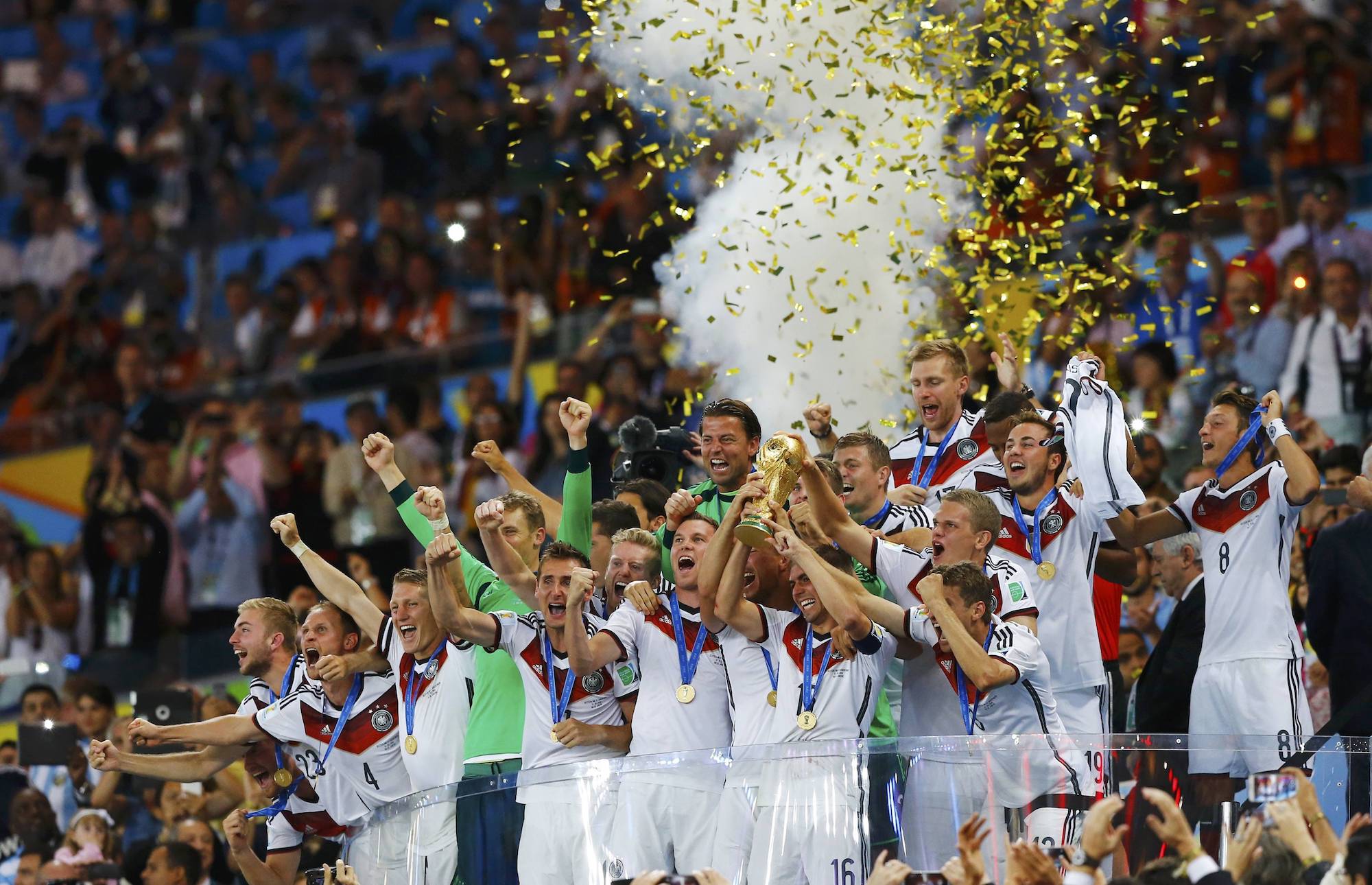Soccer and money go hand in hand.
The sport is watched in multiple territories around the world, and some of its most recognisable clubs – like Premier League side Manchester United, La Liga heavyweight Real Madrid, and Bundesliga powerhouse Bayern Munich – are worth close to a billion dollars each.
With attention turning to the 2018 FIFA World Cup, which kicked off on June 14 and is scheduled to end on July 15, we power-ranked all 32 nations that qualified for this summer’s tournament based on their nominal gross domestic product (GDP), as recognised by the International Monetary Fund and the Office for National Statistics in the United Kingdom.
Here are the 32 richest FIFA World Cup nations, ranked in ascending order by wealth:
32. Senegal — $16 billion. Senegal secured a shock victory over Poland in its first World Cup Group H match on July 19, and is next in action on June 24.

Source: International Monetary Fund.
31. Iceland — $23 billion. Nicknamed "Our Boys," Iceland is the smallest nation by population to ever make it to the World Cup. It secured a stunning draw against Argentina in its first game on June 16.

Source: International Monetary Fund.
30. Tunisia — $40 billion. Tunisia has a diverse economy with brands specialising in the manufacturing and mining sectors. The country's soccer team lost its first match against England on June 18 and will hope to bounce back against Belgium on Saturday.

Source: International Monetary Fund.
29. Serbia — $41 billion. The country has a number of notable players in its soccer squad including vice captain Nemanja Matić, a midfielder at Manchester United.

Source: International Monetary Fund.
28. Croatia — $54 billion. Croatia's best ever World Cup performance came in 1998, when it reached the semi finals and provided the tournament with the top scorer in Davor Šuker, who scored six goals in seven games.

Source: International Monetary Fund.
27. Costa Rica — $58 billion. One of Costa Rica's most important employers is Amazon, which has thousands of employees in the country. The country's soccer team is a massive underdog at the 2018 FIFA World Cup but pulled a number of surprises at the last tournament when it reached the quarterfinal stage in 2014.

Source: Seattle Times and International Monetary Fund.
26. Uruguay — $58.5 billion. Two-time FIFA World Cup winner Uruguay has two of the best strikers in world football at its disposal this summer — Paris Saint-Germain goalscorer Edinson Cavani and FC Barcelona attacker Luis Suárez.

Source: International Monetary Fund.
25. Panama — $61 billion. Panama's soccer team made its first ever appearance at a FIFA World Cup tournament, losing to Belgium in Group G on June 18 in Russia. It faces England next, on Sunday.

Source: Trading Ecomonics and International Monetary Fund.
24. Morocco — $109 billion. Tourism is massively important to Morocco's economy and the country was once classified as the world's largest exporter of cannabis resin, according to the United Nations. The national soccer team is currently rooted to the bottom of Group B having lost two games so far.

Source: Reuters and International Monetary Fund.
23. Peru — $215 billion. Peru has one of the world's fastest-growing economies and has a well-developed services, tourism, and construction sector. Peru's national soccer team only just snuck into the 2018 FIFA World Cup but will be hoping to put together a string of victories in Group C this summer.

Source: BBC and International Monetary Fund.
22. Portugal — $218 billion. Portugal will be looking to maintain the success it enjoyed at the UEFA Euro 2016 tournament, having won the competition. And, led by Cristiano Ronaldo, who has scored four goals so far, it is currently looking like one of the favourites for the 2018 World Cup title.

Source: International Monetary Fund.
21. Egypt — $237 billion. Egypt has already been dumped out of the 2018 FIFA World Cup, despite possessing one of the most in-form players in world soccer — Mohamed Salah.

Source: International Monetary Fund.
20. Colombia — $309 billion. Nicknamed "Los Cafeteros" because of the amount of coffee the country grows, the Colombian national team has many big-name players to field at the 2018 FIFA World Cup including James Rodríguez, Radamel Falcao, and David Ospina.

Source: International Monetary Fund.
19. Denmark — £376 billion. This will be Denmark's fifth appearance at a FIFA World Cup, and the side dubbed "De Rød-Hvide" (The Red-White) will be hoping to equal its best result when it reached the quarterfinal in 1998, losing to Brazil.

Source: International Monetary Fund.
18. Nigeria — $494 billion. Nigeria is an emerging market renowned for its oil exports. Its national soccer team, nicknamed the "Super Eagles," has qualified for six of the last seven FIFA World Cups and takes on Iceland on Friday having lost to Croatia in its opening Group D game on June 16.

Source: International Monetary Fund.
17. Belgium — $494 billion. Belgium's best performance at a FIFA World Cup was a fourth place finish in 1986. But with big-name players like Toby Alderweireld, Kevin de Bruyne, and Eden Hazard, the "Red Devils" will be hoping to equal that record in the coming weeks.

Source: International Monetary Fund.
16. Poland — $526 billion. Poland's national team qualified for its first World Cup since 2006 and will be looking for prolific striker Robert Lewandowski to inflict maximum damage against Group H opponents Colombia and Japan.

Source: International Monetary Fund.
15. Sweden — $538 billion. Sweden has a national team that has made 12 World Cup appearances to date. Its best performance came in 1958, losing 5-2 to a Pelé inspired Brazil in the tournament final.

Source: International Monetary Fund.
14. Argentina — $637 billion. This is Argentina's 17th appearance at a FIFA World Cup competition. It won the tournament twice — in 1978 and again in 1986. It will be led by the likes of Lionel Messi, Ángel Di María, and Nicolás Otamendi.

Source: International Monetary Fund.
13. Switzerland — $678 billion. Switzerland has a high-tech prosperous economy and is renowned for exporting chemicals, watches, and coffee. Its national soccer team is a three-time FIFA World Cup quarterfinalist.

Source: International Monetary Fund.
12. Saudi Arabia — $683 billion. Saudi Arabia is one of Asia's most successful national soccer teams but it has already been knocked out of the 2018 FIFA World Cup because of back-to-back losses to Russia and Uruguay.

Source: International Monetary Fund.
11. Mexico — $1.1 trillion. Mexico is a solid World Cup team as it has made it out of the group stage at every tournament since 1994. It got its 2018 World Cup campaign off to the best of starts when it stunned Germany with a 1-0 win on Sunday.

Source: International Monetary Fund.
10. Spain — $1.3 trillion. Spain has featured in 15 of the 21 FIFA World Cup tournaments to date, winning the 2010 competition in South Africa.

Source: International Monetary Fund.
9. Australia — $1.37 trillion. Nicknamed the "Socceroos," Australia is making its fifth appearance at a FIFA World Cup tournament. Australia's economy generates income from telecommunications, banking, and manufacturing.

Source: International Monetary Fund.
8. Russia — $1.5 trillion. Russia is hosting this summer's FIFA World Cup. There are 11 host cities, with the final taking place on July 15 at the Luzhniki Stadium in Moscow.

Source: International Monetary Fund.
7. Iran — $1.6 trillion. Iran's national soccer team has been the highest-ranked Asian country since 2014. It has qualified for the World Cup five times and will hope goal-hungry players like Sardar Azmoun can make a difference against Portugal on Monday, as it currently only has three points from a possible six in Group B.

Source: International Monetary Fund.
6. England — $2.02 trillion. A World Cup champion in 1966, England has consistently underwhelmed in recent tournaments but will be hoping it can make the final eight — or better — this time around.

Source: Office for National Statistics.
5. South Korea — $2.03 trillion. Known for its international tech brands like LG Electronics and Samsung, South Korea is one of the world's major economies. It is also a major soccer power in Asia as it is marking its 10th appearance at the FIFA World Cup. Its best performance was a semifinal outing in 2002 — it eventually lost to Germany.

Source: International Monetary Fund.
4. Brazil — $2.05 trillion. Brazil is active in agricultural, manufacturing, and service sectors and has the largest economy in South America. The country is perhaps most famous for producing five World Cup winning teams. Its top scorer Pelé — a three-time World Cup winner himself — is seen as one of the best players of all time.

Source: World Soccer and International Monetary Fund.
3. France — $2.5 trillion. Financial services, banking, and insurance all make significant contributions to France's economy, but it is also a soccer hotspot. In Thierry Henry, Michel Platini, and Zinedine Zidane, it has produced some of the finest players ever. France won the World Cup in 1998 and is one of the favourites to pick up the trophy this summer.

Source: International Monetary Fund.
2. Germany — $3.6 trillion. Germany enjoys an innovative economy with significant exports in vehicles, machinery, and pharmaceuticals. Germany is also one of the best World Cup nations of all time with four titles. The last time it failed to reach the quarterfinal stage was 1978 — 40 years ago.

Source: International Monetary Fund.
1. Japan — $4.8 trillion. Japan is the third largest economy in the world, after China and USA. It has produced some of the world's most recognisable brands like Toyota, Sony, and Nintendo. Its national soccer team has qualified for every FIFA World Cup since 1998 and is a solid bet to make it out of the group stage having secured three points from a possible three so far.

Source: International Monetary Fund.

